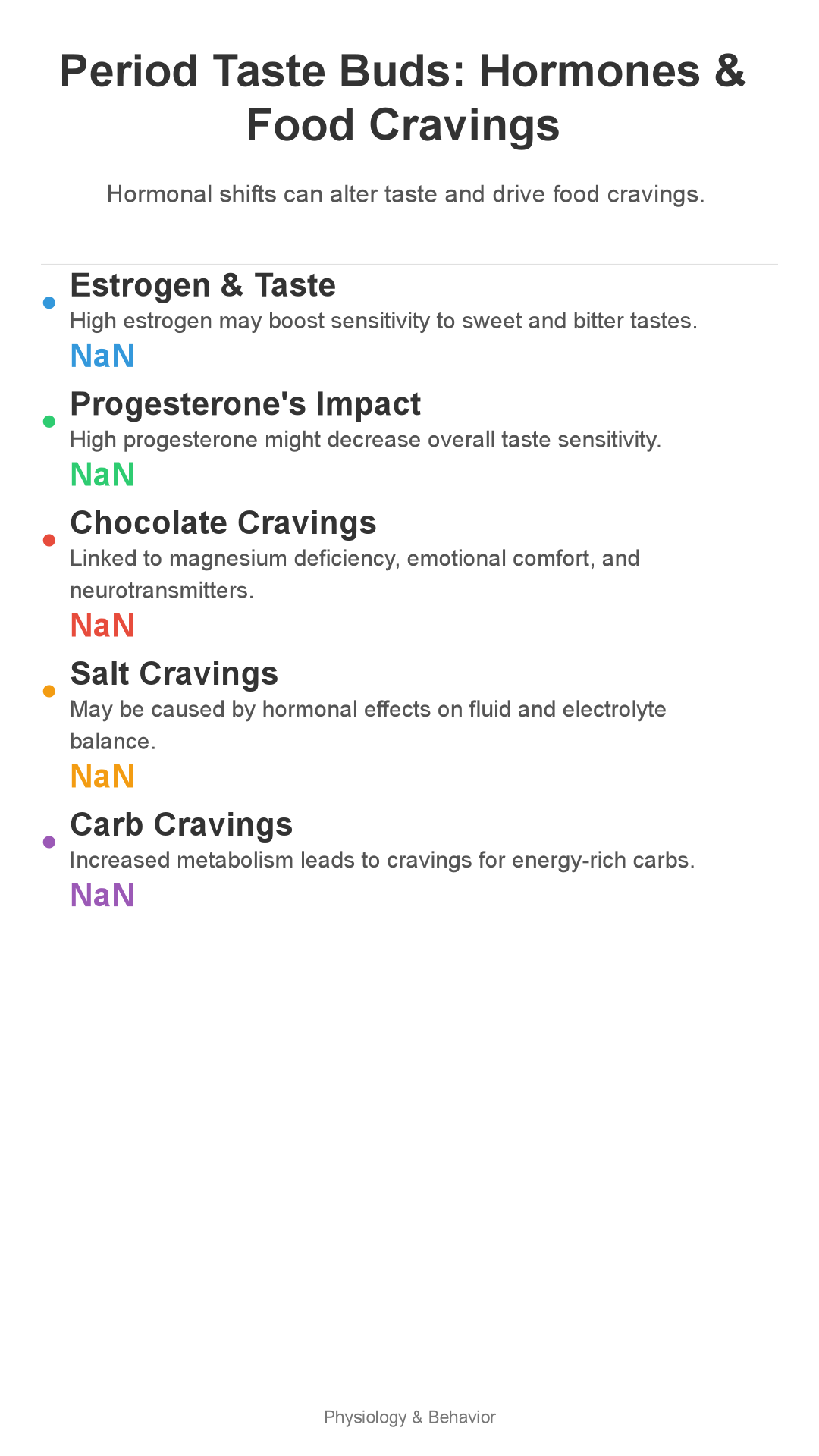
Do your taste buds change during your menstrual cycle? You're definitely not alone! This video explo
Ever find yourself devouring an entire bag of chips during your period, only to swear off salt the rest of the month? Or maybe a dark chocolate bar is the only thing getting you through PMS? Let’s explore the bizarre connection between your menstrual cycle and your taste buds – is it real, or all in your head?
Hey flavor fanatics and period pros! Smash that like button if your taste buds have ever betrayed you during your menstrual cycle. And be sure to follow for more deep dives into the strange and wonderful world of the human body.
Hormonal Fluctuations and Taste Perception: A Tangled Web
Alright, let’s get scientific. The menstrual cycle is a hormonal rollercoaster, primarily driven by estrogen and progesterone. But do these hormonal surges and dips actually change how we perceive flavor? The answer is… complicated!
Estrogen and Progesterone’s Role
Estrogen and progesterone do far more than just manage reproductive health. They act like tiny messengers, influencing various bodily functions, including the sensitivity of our sensory receptors.
These receptors, located on our taste buds, are responsible for detecting sweet, salty, sour, bitter, and umami flavors.
When estrogen levels are high (typically around ovulation), some studies suggest women may experience a heightened sensitivity to sweet and even bitter tastes.
Conversely, when progesterone levels are dominant (during the luteal phase, after ovulation), overall taste sensitivity might decrease.
Studies on Taste Sensitivity
Research in this area is still developing, but several studies have investigated the link between hormonal changes and taste perception.
Some have found that taste thresholds – the minimum amount of a substance needed to detect a specific taste – can fluctuate throughout the menstrual cycle.
For instance, a study in the journal “Physiology & Behavior” discovered that women were more sensitive to bitter tastes during the premenstrual phase.
Potential Impact on Specific Tastes
So, how might these hormonal shifts impact your daily eating habits?
- Sweet: Increased estrogen could make sweet foods taste even sweeter, potentially increasing sugar cravings.
- Salty: Some women crave salty foods during their period, possibly due to hormonal effects on fluid balance and sodium levels.
- Bitter: Heightened sensitivity to bitter could be why that kale salad you usually enjoy suddenly tastes like a punishment.
- Sour: Changes in sour taste perception might influence cravings for citrus fruits or tangy, vinegar-based dressings.
- Umami: While less commonly discussed, fluctuations in umami sensitivity could affect cravings for savory, meaty, or brothy flavors.
The Chocolate Craving Connection: More Than Just Taste
Ah, chocolate. The quintessential period comfort food. But why do so many women crave it like their life depends on it during PMS? Is it purely a matter of taste, or is there something more going on?
Magnesium Deficiency
One popular theory links chocolate cravings to magnesium deficiency. Magnesium levels tend to dip during the luteal phase, and dark chocolate is a relatively good source of this essential mineral.
Your body, in its infinite wisdom, might be signaling a need for magnesium through intense chocolate cravings.
Emotional Comfort and Reward
Let’s be honest, chocolate is comforting. During PMS, when emotions are heightened, chocolate can provide a sense of emotional relief and reward. It’s a socially acceptable and easily accessible treat that can temporarily soothe feelings of stress, anxiety, or sadness.
Neurotransmitters
Chocolate contains compounds that can influence neurotransmitter levels in the brain. It can specifically boost serotonin and dopamine, both associated with mood regulation and pleasure. So, that chocolate bar isn’t just delicious; it’s also a mini-dose of happiness!
Beyond Chocolate: Other Food Cravings and Aversions
It’s not just chocolate that gets the period craving treatment. Many women experience cravings for other foods, as well as aversions to certain tastes and smells during different phases of their cycle.
Salt Cravings
Salt cravings are common during the premenstrual phase. This could stem from hormonal effects on fluid retention and electrolyte balance. The body might be craving sodium to help retain water and maintain blood pressure.
Carbohydrate Cravings
Carbohydrates are the body’s primary energy source. During the luteal phase, metabolism increases slightly, leading to a greater need for energy. This can manifest as cravings for carbohydrate-rich foods like pasta, bread, and sweets.
Aversions
Conversely, some foods that are normally appealing can become completely repulsive during certain times of the month.
This could be due to heightened sensitivity to smells, changes in taste perception, or hormonal influences on the digestive system.
The Subjectivity of Taste and Individual Variation
It’s important to remember that taste perception is highly subjective and varies significantly from person to person. Not everyone experiences the same cravings or aversions during their menstrual cycle.
Genetic Predisposition
Genes play a significant role in determining taste preferences. Some people are genetically predisposed to be “supertasters,” meaning they have a higher density of taste buds and are more sensitive to flavors. Others have a lower density and may be less sensitive.
Lifestyle Factors
Diet, stress levels, sleep quality, and even medications can all influence taste perception. A diet high in processed foods and sugar can desensitize taste buds over time, while chronic stress can alter hormone levels and affect cravings.
The Placebo Effect and Anecdotal Evidence
It’s easy to blame every craving on hormones, but the placebo effect can also play a role. If you believe you’re *supposed* to crave chocolate during your period, you might be more likely to experience that craving.
Anecdotal evidence is interesting, but it’s important to differentiate between personal experiences and scientifically proven facts.
So, do period cycles *actually* subtly alter our taste buds? The science suggests a potential link, influenced by hormonal fluctuations, nutritional needs, and emotional factors.
Now, I’m curious: What are the weirdest or most intense food cravings *you’ve* experienced during your period?
And if you’re looking for healthier ways to manage those cravings, consider incorporating magnesium-rich foods into your diet, practicing stress-reducing techniques, and prioritizing sleep.
And hey, sometimes, indulging in a little chocolate is exactly what you need.
Don’t forget to subscribe for more fascinating explorations of the human body. We’ll see you in the next rabbit hole!

Enjoyed this? Check out our YouTube channel for video versions!
Enjoyed this? Check out our YouTube channel for video versions!



